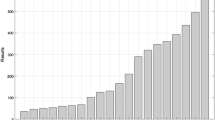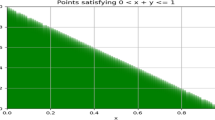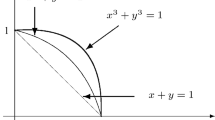Abstract
The typical practice of income inequality evaluation is by using inequality indices. Yet there is no “best” measure of inequality as we know it, and hence, any conclusion based on an inequality index must be subject to some doubts. Some authors even argued that the concept of inequality, by its very nature, is vague, and thus, cannot be measured like an exact concept. Motivated by these considerations, this paper studies axiomatic fuzzifications of inequality measures. Consequently, a systematic method of viewing the conclusions of inequality comparisons in terms of truth value statements is developed. Furthermore, it is shown that this method (or in fact, any other fuzzy inequality measure) can be used to construct confidence intervals for the crisp conclusions of inequality indices.
Similar content being viewed by others
References
Aczel J (1993) Personal communication
Atkinson AB (1975) The Economics of inequality. Clarendon Press, Oxford
Banerjee A (1993) Rational choice under fuzzy preferences. Fuzzy Sets and Systems 53: 295–299
Baron K (1993) Personal communication
Basu K (1987) Axioms for a fuzzy measure of inequality. Math Soc Sci 14: 275–288
Basu K, Deb R, Pattanaik P (1992) Soft sets: an ordinal formulation of vagueness with some applications to the theory of choice. Fuzzy Sets and Systems 45: 45–57
Bezdek JCC, Spillman B, Spillman R (1978) A fuzzy relation space for group decision theory. Fuzzy Sets and Systems 1: 255–258
Bezdek JCC, Harris JD (1978) Fuzzy partitions and relations. Fuzzy Sets and Systems 1: 111–127
Billot A (1992) Economic theory of fuzzy equilibria. Springer, Berlin
Braun D (1988) Multiple measurements of US income inequality. Rev Econ Stat 70: 398–405
Dasgupta P, Sen A, Starrett D (1973) Notes on the measurement of inequality. J Econ Theory 6: 180–187
Dimitru V, Luban F (1982) Membership functions, some mathematical programming models and production scheduling. Fuzzy Sets and Systems 8: 19–33
Dimitru V, Luban F (1986) On some optimization problems under uncertainty. Fuzzy Sets and Systems 18: 257–272
Dombi J (1990) Membership functions as an evaluation. Fuzzy Sets and Systems 35: 1–21
Dubois D, Prade H (1985) Fuzzy sets and systems: theory and applications. Academic Press, New York
Fields G, Fei JCH (1978) On inequality comparisons. Econometrica 46: 303–316
Hannan EL (1981) Linear programming with multiple fuzzy goals. Fuzzy Sets and Systems 6: 235–248
Hersh HM, Caramazza AA (1976) A fuzzy set approach to modifiers and vagueness in natural languages. J Exp Psychol 105: 254–276
Hersh HM, Caramazza AA, Brownell (1979) Effects of context on fuzzy membership functions. In: Fuzzy Set Theory and Applications, (eds) Gupta MM et al. North-Holland, Amsterdam, pp. 565–579
Gougen JA (1968) The logic of inexact concepts. Synthese 19: 325–373
Kaufmann A (1975) Introduction to the theory of fuzzy subsets. Vol 1, Academic Press, New York
Kochen M, Badre AN (1974) On the precision of adjectives with denote fuzzy sets. J Cybernet 4: 49–59
Marshall AW, Olkin I (1979) Inequalities. Academic Press, New York
Ok E (1993) Fuzzy income inequality measurement I. CAE working paper No. 93-05
Ok E (1994) A note on the approximation of fuzzy preferences by exact relations. Fuzzy Sets and Systems (forthcoming)
Orlovsky SA (1978) Decision making with a fuzzy preference relation. Fuzzy Sets and Systems 1: 155–167
Ovchinnikov S (1981) Structure of fuzzy binary relations. Fuzzy Sets and Systems 6: 169–195
Ovchinnikov S (1986) On the transitivity property. Fuzzy Sets and Systems 20: 241–243
Ovchinnikov S (1991) Similarity relations, fuzzy partitions and fuzzy orderings. Fuzzy Sets and Systems 40: 107–126
Sen A (1973) On economic inequality. Clarendon Press, Oxford
Sen A (1992) Inequality reexamined. Harvard University Press, Harvard
Smithson M (1986) Fuzzy set analysis for behavioral and social sciences. Springer, Berlin
Tanino T (1984) Fuzzy preference orderings in group decision making. Fuzzy Sets and Systems 12: 117–131
Zadeh LA (1965) Fuzzy sets. Information and Control 8: 338–353
Zadeh LA (1971) Similarity relations and fuzzy orderings. Inf Sci 3: 177–206
Zimmermann HJ (1985) Fuzzy set theory. Kluwer-Nijhoff, Dordrecht
Author information
Authors and Affiliations
Additional information
I wish to thank Kaushik Basu, Larry Blume, Gary Fields, Tapan Mitra, Maurice Salles, Anthony Shorrocks, Sinan Unur, the participants of the 1993 Midwest Mathematical Economics Conference held in University of Wisconsin at Madison and those of the 2nd International Meeting of the Society for Social Choice and Welfare held at University of Rochester, and two anonymous referees for insightful comments and suggestions. Janos Aczel and Karol Baron kindly provided some help about a mathematical problem I faced, I am grateful to them. Needless to mention, however, the usual disclaimer applies.
Rights and permissions
About this article
Cite this article
Ok, E.A. Fuzzy measurement of income inequality: a class of fuzzy inequality measures. Soc Choice Welfare 12, 111–136 (1995). https://doi.org/10.1007/BF00179828
Received:
Accepted:
Issue Date:
DOI: https://doi.org/10.1007/BF00179828




